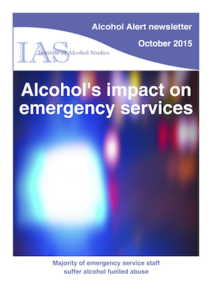In this month’s alert
Editorial – October 2015
Welcome to the October edition of Alcohol Alert, the Institute of Alcohol Studies newsletter, covering the latest updates on UK alcohol policy matters.
In this issue, a new IAS report highlights the burden of alcohol misuse on the emergency services. Other articles include: Global Alcohol Policy Conference sees First Minister for Scotland Nicola Sturgeon reaffirm the Scottish Government’s commitment to minimum unit pricing; a London School of Hygiene & Tropical Medicine evaluation finds alcohol industry failing to meet its ‘Responsibility Deal’ labelling pledges; and Northern Ireland looks to loosen its legislation over the sale of alcohol in newly built outdoor venues.
Please click on the article titles to read them. We hope you enjoy this edition.
Majority of emergency service staff suffer alcohol fuelled abuse
Report reveals a culture of fear among workers dealing with alcohol-related cases
A new report from the Institute of Alcohol Studies, Alcohol’s Impact on Emergency Services, reveals the full extent of the toll alcohol takes on emergency services in England.
The report presents an extensive survey of police officers, ambulance and paramedic staff, accident and emergency department consultants and fire officers. It outlines both the financial burden on the emergency services and the human cost to frontline staff. The report also recommends a set of evidence-based policy measures to address this issue.
Survey findings include:
- Violence against emergency services is ubiquitous, with 76% of police, and 50% of ambulance staff having been injured on the job as a result of drunken violence
- Between a third and a half of emergency service staff have suffered sexual harassment or assault in the line of duty
- Alcohol takes up as much as half of emergency service time
- Emergency services are increasingly stretched, with over 90% of police and ambulance staff reporting they have performed the role of another blue light service in dealing with alcohol-related incidents
- Over half of emergency service staff feel inadequately trained to deal with alcohol-related incidents
Institute of Alcohol Studies Director Katherine Brown said:
“Our report shows how alcohol takes up a disproportionate share of emergency service time, costing taxpayers billions of pounds each year. Many of these incidents are preventable, and alcohol therefore creates unnecessary problems for front line staff, increasing their workload and preventing them from dealing with other important issues. Police officers we spoke to would far rather be dealing with burglaries than Friday night drunks.
“We call on the Government to better support our emergency services and implement policies to ease this burden, such as minimum unit pricing for alcohol. Local Authorities could also do more by using their licensing powers more proactively, such as trying to bring forward extremely late closing times where needed.”
Media coverage
Much was made of calls by the police to end 24-hr licensing, as was reported in The Guardian, Daily Mail and The Mirror.
ITV show Good Morning Britain focussed on the strain that alcohol misuse places on ambulance staff by shadowing of London based paramedics during a night shift, which graphically detailed the extent of the problem.
The report also was the subject of debate on radio, with alcohol control advocate and former New Labour spokesperson Alistair Campbell admitting to Iain Dale on LBC that former Prime Minister Tony Blair “got it wrong” over the 2003 Licensing Act.
Trade reaction was typically negative, with Steve Ball of the Night Time Industries Association accusing the report of taking a “one dimensional” approach and Brigid Simmons of the British Beer and Pub Association arguing that 24-hr drinking was a “myth”.
But public health groups, such as the Royal College of Emergency Medicine welcomed the report. President Dr Cliff Mann said:
“We as a College are extremely concerned about the harm attributable to alcohol, including the impact on the ambulance service in the UK and our already hard-pressed Emergency Departments.
“Fellows and Members of the College are confronted daily with the health impacts of alcohol use, and also experience the effects of alcohol intoxication on behaviour, including social disorder and lawlessness which sometimes spills over into the hospital environment in general, and Emergency Departments in particular. The steps laid out in this report will go a long way to tackling these challenges.”
The report was also well received among parliamentarians attending the oral evidence session of the All-Party Parliamentary Group on Alcohol Harm on 26 October, where Brown presented the report’s findings as part of an inquiry into the ‘Impact of Alcohol on the Emergency Services’. MP for Luton North Kelvin Hopkins was so moved as to announce an Early Day Motion [EDM601] based upon the findings.
Recommendations
The report recommends the following policies:
- Further trialling of Alcohol Treatment Centres (special facilities designed to help people who are highly intoxicated by providing a safe place to sober up, whilst offering supervision and elements of clinical care)
- Delivering Identification and Brief Advice (IBA) at ‘teachable moments’
- A lower drink drive limit (50mg of alcohol per 100ml of blood)
- Better information sharing between police and emergency departments
- More assertive use of licensing powers by local authorities
- Reducing the affordability of alcohol, for example through a minimum unit price.
Alcohol’s Impact on Emergency Services Full Report: bit.ly/alcemergencyservices
Watch a short video animation outlining the report’s main findings here: https://vimeo.com/instalcstud/emergencyservices
GAPC 2015 a success as Scotland’s First Minister reaffirms commitment to minimum unit pricing
Tougher legislation limiting industry power at the heart of advocates’ control policy proposals
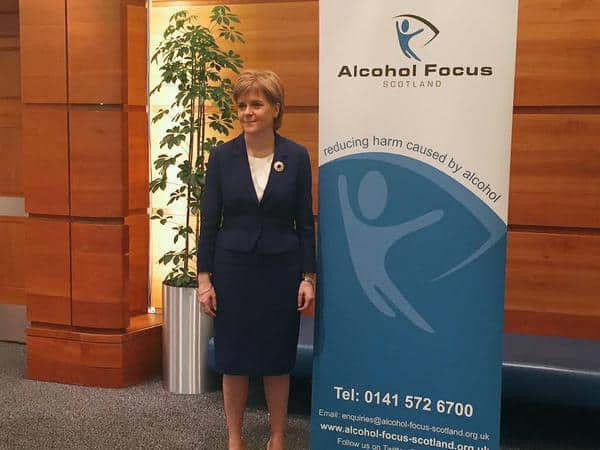 The Scottish Government remains “absolutely committed” to minimum unit pricing for alcohol as an “essential part” of transforming the country’s drinking culture, said Nicola Sturgeon (pictured) at a global alcohol conference keynote speech.
The Scottish Government remains “absolutely committed” to minimum unit pricing for alcohol as an “essential part” of transforming the country’s drinking culture, said Nicola Sturgeon (pictured) at a global alcohol conference keynote speech.
Addressing the fourth Global Alcohol Policy Conference, held in Edinburgh and attended by more than 400 health researchers and campaigners from across the world, she confirmed that “the Scottish Government continues to be absolutely committed to minimum unit pricing.
Sturgeon stressed the importance of making the case “against the sale of deadly cheap alcohol”, adding that during the course of the three-day event “approximately 300 people in Scotland will be admitted to hospital as a result of alcohol misuse, and approximately 10 people will die”.
“Those statistics demonstrate all too clearly why minimum unit pricing is the right measure for Scotland to reduce the harm that cheap, high-strength alcohol causes our communities,” she said.
“We firmly believe that minimum pricing will reduce damaging alcohol consumption, improve health and save lives – and that it will do so more effectively than any alternative measures available to us.”
The policy, aimed at reducing the affordability of alcohol, is currently subject to court proceedings after being challenged by a group of global alcohol producers represented by the Scotch Whisky Association two years ago.
The First Minister also welcomed the most recent legal opinion on the case, given by the European Court of Justice Advocate General (Yves Bot) last month. Sturgeon reiterated Yves Bot’s statement that minimum unit pricing is “not precluded by European Union law; is for the domestic courts to take a final decision; and that the policy can be implemented if it is shown to be most effective public health measure available.”
Evidence-based advocacy over tricks of the trade
The plenary sessions were dominated by calls for alcohol policy advocates to galvanise their efforts to counter industry tactics.
The first day saw prominent researchers Professor Jim McCambridge and Tom Babor present an overview of industry strategies and tactics in the UK, while University of Auckland law Professor Jane Kelsey warned that the advent of mega trade treaties such as the Trans Pacific Partnership (TPP) agreement pose a potentially huge threat to alcohol control policies.
On the following day, University of Liverpool law Professor Amandine Garde questioned whether the problem of pervasive marketing practices towards children could be tackled from a human rights angle, and social marketing guru Professor Gerard Hastings spoke of the need for radical action to “overcome” the power imbalance between policy advocates and the industry.
The conference was rounded off by a tribute to Global Alcohol Policy Alliance (GAPA) departing Chair and founder Derek Rutherford, who passes the mantle over to New Zealand Professor Sally Casswell after four decades of service dedicated to curbing alcohol misuse.
Attendance to the Global Alcohol Policy Conference was exclusively for public health academics and advocates of alcohol control policies, and free of industry interests. Trade publication Spirits Business reported Scotch Whisky Association chief David Frost’s frustration at not getting an invitation.
He wrote: “We believe partnership working between government and other stakeholders is fundamental to tackling alcohol harm. It is therefore frustrating that we, along with all members of the alcohol industry, have been told we are not welcome.”
However, evidence demonstrates conclusively that the actions of alcohol producers stymies the development of national alcohol control policies across the globe, and the intention of the GAPC events is to allow control policy advocates to focus on how best to reduce alcohol harm independent of vested interests.
Momentum for change: Research and advocacy reducing alcohol harm was the fourth conference presented by the Global Alcohol Policy Alliance, and organised by Alcohol Focus Scotland. The next conference will be held in Australia and hosted by Foundation for Alcohol Research and Education (FARE).
Watch Alcohol: a global concern a film by Alcohol Focus Scotland
Watch Nicola Sturgeon deliver her keynote speech:
Comment on the Policy Innovation Research Unit’s evaluation of the Responsibility Deal Labelling Pledge
-
The alcohol industry has once again been demonstrated to have fallen short of its pledge to ensure 80% of products have a clear, legible health warning
-
Moreover, the industry has failed to keep to the spirit of the pledge, undermining public health messages even when complying
-
In any case, the rules designed by the industry for itself are not supported by the evidence as effective measures to improve public health
Important new research recently published by the Department of Health-funded Policy Innovation Research Unit (PIRU) once again demonstrates the failings and limitations of the alcohol industry’s self-regulation through the Responsibility Deal.* What they have shown is the industry’s failure to adhere to either the letter or spirit of it’s own commitments on labelling. Moreover, it is worth re-emphasising that these commitments are so weak that there is no evidence to suggest they will reduce alcohol consumption or harms, thus leaving industry profits untouched.
The study finds that the headline commitment of 80% compliance with labelling standards has been missed, albeit narrowly, and so the industry has failed to keep to the letter of its regulations. According to PIRU, 78% of products they examined met the standards agreed as part of the Public Health Responsibility Deal, displaying on the label: i) the number of units of alcohol contained in the drink; ii) the Chief Medical Officer’s guidelines for consumption; iii) a warning about the risks of drinking while pregnant.
This confirms the results of an industry-commissioned audit from Campden BRI, which also found that labelling standards fell short of the pledge. It discovered that only 70% of products in the off-trade complied with this pledge, when weighted by market share of total alcohol volume. Thus there is reason to suspect that the PIRU analysis would have been more damning if weighted to account for market share and strength. What the PIRU research has added is an appreciation of the way in which the industry is bending the rules, even when it complies with the strict letter of the Responsibility Deal. In the Campden BRI analysis, only 47% of labels reflected what is considered ‘best practice’ by industry-agreed standards. The PIRU paper demonstrates vividly the ways in which these departures undermine public health messages on labelling.
According to the new study, the average font size for health information on labels is 8.17, well below the 10-11 point size that is optimal for legibility. 60% of labels display health information in smaller font than then the main body of information on the label, contrary to official industry guidance. Pregnancy warnings are significantly smaller on drinks targeted at women than men.
Even more importantly, we ought to remember that the rules the industry has designed for itself are not supported by the evidence as effective measures to improve public health, and so even if implemented diligently, there is no guarantee that they would reduce harm or hurt industry profits. A recent independent systematic review of the evidence, again from PIRU, found that most of the pledges in the Responsibility Deal with government “fall into the category of ‘probably ineffective’ or ‘no/poor/inconclusive evidence’”.
Research into the effect of providing guidelines, warning labels and unit alcohol content on alcohol packaging has found that whilst such information can help to raise awareness amongst consumers of the risks associated with alcohol consumption, existing labelling schemes have had no substantial effect on how much people drink.
The PIRU study has revealed the flawed implementation of a flimsy pledge, further vindicating those who warned that the Responsibility Deal was insufficiently evidenced and robust.
* Knai C, Petticrew, M, et al (October 2015)., ‘Health information on alcoholic beverage containers: has the alcohol industry’s pledge in England to improve labelling been met?‘ Addiction
Northern Ireland looking to loosen liquor licence legislation
Consultation seeks approval for sales of alcohol in outdoor stadia
Changes are being proposed to the current alcohol licensing laws for outdoor stadia in Northern Ireland. Led by Judith Cochrane, Alliance MLA for East Belfast, the plans involve creating a new category of licence for stadia “of regional or national importance”.
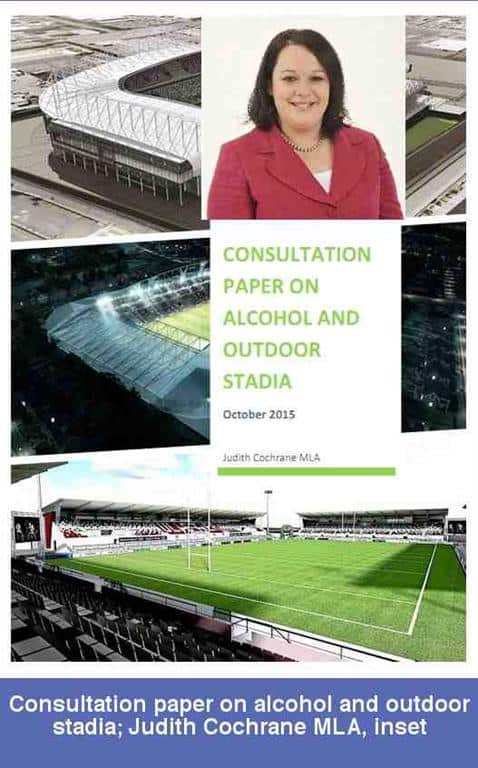
Existing liquor licence legislation states that a venue such as Kingspan Stadium must apply to the courts for occasional licences to allow the sale and consumption of alcohol on the premises. This is due to the fact that multi-use outdoor venue capable of holding multiple types of event were not “envisaged when the current liquor licensing law was being formulated and therefore this type of venue is not included in the list of premises which may make an application for a liquor licence (other than an occasional licence).”
Adding a new ‘outdoor stadia’ category (suitably defined) to Article 5(1) of the Licensing Order would enable applications to be made for a permanent liquor licence for such outdoor stadia, removing the administrative burden of making repeated applications for an occasional licence. It would also bring such stadia into line with existing licensing arrangements for indoor arena.
The three-week consultation (closing date: 30 October) was triggered by the redevelopment of the three main outdoor stadia in Northern Ireland, namely Kingspan Stadium (formerly known as Ravenhill), Casement Park and the National Football Stadium at Windsor Park; and the dissatisfaction with current arrangements permitting the sale and consumption of alcohol.
Safeguards
Existing safeguards would still apply to outdoor stadia of national importance, including the fact that the sale of alcohol must be ancillary to the normal business carried on in the premises; the sale of alcohol must be restricted to Northern Ireland’s general permitted hours; and that alcohol sold must be consumed on the premises. The court will also have the power to attach any conditions considered appropriate, especially regarding cases such as events attended predominately by young people.
Aside from any administrative changes, the key difference should this proposal come into law relates to children and young people. Under the current occasional licence arrangement used by such stadia, young people are required to be off the premises by 9pm, which is often earlier than the end of a sporting event. The preferred option within the consultation would allow a young person, if accompanied by an adult, to remain in the licensed parts of the premises until a later hour in the evening.
To mitigate the prospect of a proliferation of venues in the long run, Judith Cochrane’s plans state that the relevant Minister would need to designate such outdoor stadia as one of regional or national importance in order to qualify for the new licence, and that these are likely to remain small in number.
In the Belfast Telegraph, Judith Cochrane said: “Our licensing laws have changed little since 1996 but Northern Ireland is a very different place today. We have a proud record of hosting world-class sporting events but our stadia could be prevented from maximising opportunities due to current restrictions.
“Ultimately, licensing laws need to balance the need to protect the public’s health and the need to operate business, and I believe we struck that in 2004 when changes were made to allow indoor arenas in Northern Ireland to apply for a liquor licence.
“State-of-the-art multi-use stadia are not covered by the current legislation. A large amount of public money has been allocated to redevelop them but unless this change happens, we will not see them realise their full potential.”
Europe still has the highest rates of alcohol consumption in the world
WHO findings add weight to Eurocare’s call for a new EU alcohol strategy
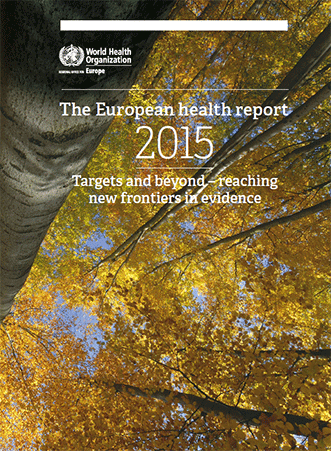 Alcohol consumption, tobacco use and obesity, all major risk factors for premature mortality, remain alarmingly high in the European Region, according to the WHO European Health Report 2015.
Alcohol consumption, tobacco use and obesity, all major risk factors for premature mortality, remain alarmingly high in the European Region, according to the WHO European Health Report 2015.
The report also shows that the European Region continues to have the highest levels of alcohol consumption and tobacco use in the world, and that, for obesity and overweight, Europe ranks only slightly behind the Region of the Americas.
Still according to the WHO report (pictured), the European Region has acknowledged the urgency of these problems, and progress is being made, through the implementation of policies to tackle the risk factors – and that this is leading to declining trends in alcohol consumption and tobacco use.
In response to the report, alcohol policy campaigners Eurocare have recommended that the European Commission introduces a new EU Alcohol Strategy in order to continue and cement the progress made from the previous one. Among the scientific-based recommendations for the European Commission to include in a future EU Alcohol Strategy, Eurocare point out that Member States should be supported in their work to address the full spectrum of alcohol problems, since there is need for whole-population-level responses.
Charity highlights growing research on link between alcohol and depression
Adapted from Alcohol Concern press release
Depression is one of the most common mental health problems in the UK – experienced by as many as one in ten people in any year – and it shares a complex, mutually reinforcing relationship with excessive alcohol consumption, according to a new factsheet released by charity Alcohol Concern.
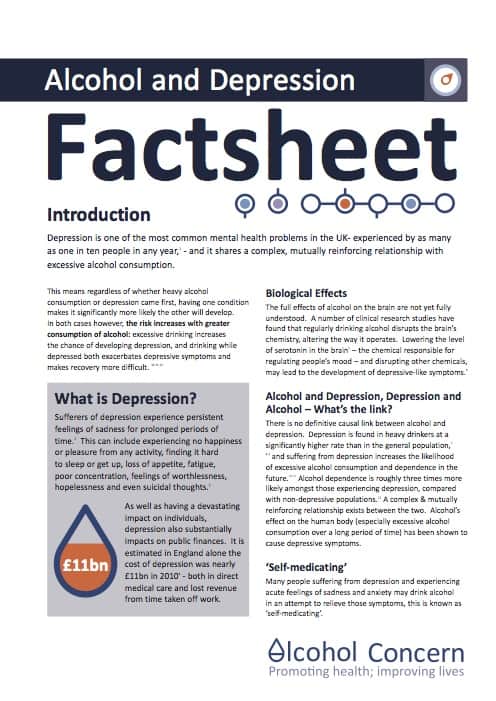 The Alcohol and Depression Factsheet (pictured) shows how the relationship works both ways; depression is found in heavy drinkers at a significantly higher rate than in the general population, and those suffering from depression have an increased likelihood of excessive alcohol consumption and dependence in the future.
The Alcohol and Depression Factsheet (pictured) shows how the relationship works both ways; depression is found in heavy drinkers at a significantly higher rate than in the general population, and those suffering from depression have an increased likelihood of excessive alcohol consumption and dependence in the future.
Excessive alcohol consumption over a long period of time has been shown to cause depressive symptoms. A number of clinical research studies have found that regularly drinking alcohol disrupts the brain’s chemical responses, altering the way it operates due to lowering levels of serotonin.
The factsheet also highlights how:
- Regardless of whether heavy alcohol consumption or depression came first, having one condition makes it significantly more likely the other will develop
- Alcohol dependence is roughly three times more likely amongst those experiencing depression, compared with non-depressive populations
- It is estimated in England alone the cost of depression was nearly £11bn in 2010
- Suffering from depression can make reducing alcohol consumption more difficult, and vice versa – it is harder to treat depression while drinking large amounts of alcohol
Alcohol Concern Chief Executive Jackie Ballard said: “Alcohol is no ordinary product and people need to be aware of the risks associated with its use and how it can have both mental and physical effects.
“Reducing alcohol consumption can help to reduce depressive symptoms and cutting out alcohol altogether may be an important lifestyle change necessary for those suffering from depression.”
Research by the Samaritans, the suicide reduction charity, has found that men particularly can use alcohol to “self-medicate” to cope with depression or feelings of emotional distress.
Ruth Sutherland, Samaritans CEO, said: “The relationship between alcohol and suicide is complex and our own research has found that men self-medicate using alcohol and drugs as an escape from problems or as a response to emotional distress. Three-and-a-half times as many men as women take their own lives in the UK, and alcohol is associated with an increased risk of suicide.
“A further study of men who had been depressed or who performed “suicidal” self-harm found they used alcohol to manage or cope with depression. Samaritans would like to see more suicide prevention training included as standard within strategies tackle alcohol misuse by the NHS and partner agencies.”
Youth Alcohol Advertising Council wins disputes with alcohol producers
Media regulator rules against Heineken and a distillery for breaching advertising codes
The owners of Sibling Distillery have been forced to remove material from their website which depicts people under the age of 25 associated with the company, following a complaint from the Youth Alcohol Advertising Council (YAAC), a group of young people working with the charity Alcohol Concern.
YAAC alerted the Advertising Standards Authority (ASA) to the WHO WE ARE webpage on the distillery’s website, which featured a photograph of the siblings behind the company. Text stated: “We have grown up surrounded by this industry, and although the eldest of us (XXXXX) is only 23, between us have over 30 years of experience …”
According to Spirits Business, Sibling Distillery claimed that the image simply portrayed the business’s founders, owners and co-directors, that their consumers “have a right” to know who creates the products, and that no-one in the image was depicted holding or consuming alcohol.
Nevertheless, the ASA maintained that as it featured people under 25 years of age “playing a significant role” in promoting alcohol, the ad breached CAP Code (Edition 12) rule 18.16 (Alcohol), and must not appear again in its current form.
This successful ruling follows a complaint upheld by the ASA a week earlier (7 October), when drinks giant Heineken was told that their YouTube advert for Strongbow breached responsible advertising regulations.
YAAC, who review alcohol advertising against key principles of the Advertising Standards Code, challenged whether the advert portrayed alcohol as indispensable or as taking priority in life.
The ASA noted the CAP Code required that marketing communications must not imply that alcohol might be indispensable or take priority in life, but that the Heineken ad implied that alcohol was as important as, if not more important than, personal relationships and therefore was in breach of CAP Code (Edition 12) rule 18.6 (Alcohol). The advert has since been removed.
In response to the ruling, Tom Smith, Head of Policy at Alcohol Concern said: “Not only is it appalling that a company such as Heineken UK, with marketing budgets of millions, is failing to comply with the advertising codes, but it’s left to young people to spot these adverts and highlight these failings.”
Fiona Bruce MP, Chair of the All Party Parliamentary Group on Alcohol Harm, paid tribute to YAAC for taking strong action “which is in line with a trend that increasingly young people are becoming aware of the impact of drinking too much, and indeed many are deciding not to drink at all in their teenage years. We know that the later you start drinking, the fewer problems are likely to occur. We need to give them as much support as possible.”
10 million UK drink drivers, survey claims
Drivers knowingly over the limit when they get behind the wheel
Nearly a third (31%) of drivers that drink admit to driving when over the legal alcohol limit – equivalent to 10 million UK adults – according to a recent survey commissioned by insurance company RIAS as part of their Drive Fit campaign.* The report highlights how many people are still prepared to risk drink driving despite a huge decline in drink driving.
RIAS warns that those in their 30s appear to be ‘particularly irresponsible when it comes to drinking and driving’, with over two fifths (44%) admitting to driving when knowingly over the limit. The survey also claims that one fifth (20%) of thirtysomething drivers that drink believe they would be ‘safe’ to drive after six or seven glasses of beer or wine.
Although a lower number of drivers over 50 that drink admit to driving over the limit, nearly one quarter (24%) still admit to doing so. Almost a fifth (19%) of over 50s that drink also believe their alcohol tolerance is higher now than when they were younger – as such the ‘over 50s in particular are at risk of complacency as the effects of ageing come into play’ RIAS warns.
Two fifths (40%) of adults who have driven over the limit reported having encountered serious consequences as a result including losing their licence, crashing or falling asleep at the wheel.
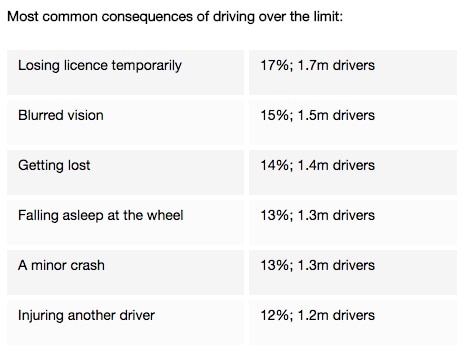
Commenting on the findings (example illustrated above), Mark Hanson, Director of Marketing at RIAS said: “Despite extensive campaigns from the Government and other organisations highlighting the dangers of drink driving, there are a large number of people still prepared to take the risk. It is clear that those in their 30s are by far most the risk taking, but drivers of all ages are taking a risk every time they drink and then get behind the wheel of their car.”
“Constant and honest self-assessment is vital for all drivers, particularly those who have many years of driving experience.”
Jackie Ballard, Chief Executive of Alcohol Concern, said: “Drink driving puts lives in danger and should never be done under any circumstances.
“Currently the drink drive limit in England and Wales is the highest in Europe, matched only by Malta. To tackle drink driving, save lives and make roads safer, we are urging the Government to lower the drink drive limit in line with Scotland and the majority of European countries.”
In 2011 it was announced the legal drink-drive limit in England would remain at 80mg per 100ml of blood (0.8 BAC) despite an independent report calling for it to be reduced to bring it in line with most European countries. Instead the Government said it would focus on “improving enforcement and education to tackle the drink and drug drivers who put lives at risk.”
In December 2014, Scotland lowered their drink driving limits to 0.5 BAC.
* Opinium Research conducted a survey among a nationally representative sample of 2,004 UK adults between 11th – 13th August 2015.
Go teetotal to reduce dementia risks, NHS says
Drinking any alcohol can increase the risk of dementia, disability and frailty. Adapted from the Daily Telegraph
Middle-aged people should go teetotal to reduce the risk of dementia, health watchdogs have said.
Guidance from the National Institute of Health and Care Excellence (NICE) on how to protect against the condition suggests that even drinking within Government safe limits can increase the risk of Alzheimer’s disease.
The new advice says the public should be advised that there is “no safe level of alcohol consumption” and calls on GPs to tackle the middle-aged about lifestyle behaviours linked to the condition.
Research has found that one third of all Alzheimer’s disease cases can be linked to lifestyle factors – such as exercise, obesity, smoking and alcohol.
Current Government advice – which is under review – suggests women can drink two to three units of alcohol a day (one 175ml glass of wine) and men three units, without compromising their health.
The new NICE advice says drinking any alcohol can increase the risk of dementia, disability and frailty, advising GPs that people should be encouraged “to reduce the amount they drink as much as possible.”
It suggests Britain’s “social norms” when it comes to alcohol “need to be challenged”.
“Drinking alcohol daily at home has become normal for some people, and this poses a threat to health,” the guidance says.
Last year new figures revealed twice as many cases of early dementia as was thought.
Professor John Britton, professor of epidemiology, University of Nottingham and Nice guideline development group chairman said: “It is well known that smoking, too much alcohol, inactivity and being overweight is bad for our health, but many people don’t realise that these things can also increase the likelihood of developing dementia and other causes of poor quality of life in older age.
“The evidence we looked at suggested that people can prevent these outcomes by making simple changes in life – stopping smoking, cutting alcohol, being more active and losing weight,” he said. “Even small but regular changes – such as climbing the stairs instead of using an escalator – can have significant effects. “
The guidance stresses that not all risks can be eliminated, given some will have a genetic susceptibility to the condition, and warns against suggesting those who develop it are “at fault”.
Hilary Evans, chief executive of Alzheimer’s Research UK, said: “There is now mounting evidence that a healthy lifestyle from mid-life can help to reduce the risk of dementia in later life, but public understanding of the risk factors for dementia is still low.”
“While we don’t yet have sure-fire ways to prevent dementia, evidence suggests that eating a balanced diet, exercising regularly, not smoking, not drinking to excess and keeping weight, blood pressure and cholesterol in check can all help lower the risk of the condition,” she said.
Strong public support in Scotland for more curbs on alcohol advertising
Adapted from the National Scotland
Scottish ministers are under pressure to back a ban on alcohol advertising near schools after research carried out by MSPs suggested there was considerable public sympathy for the policy. The proposal was backed by 78% of those who responded to a survey carried out by Holyrood’s health committee.
Its findings will inform the views of members of the cross-party body taking evidence on the Alcohol Bill, introduced into the Scottish Parliament by Labour MSP Dr Richard Simpson. Simpson wants to prohibit the advertising of alcohol within 200 metres of schools, nurseries and play parks, and to ban alcohol advertising at public events where most people taking part are children or where the event is aimed at children. The latter ban was supported by 83% of the 543 people who took part in the survey. Under his plans, those breaching the advertising regulations would be fined.
“The proposals with the strongest support were the ban on advertising near venues used by children and the ban on sponsorship of events targeted at children,” the survey report said.
The introduction of drinking banning orders, which would prohibit someone convicted of an alcohol-related offence from going into a pub for up to two years, was also popular, with support from 75% of respondents.
Simpson welcomed the public backing for his proposals. “I believe that with the minimum unit pricing, and the legislation still being suspended in the European Court, this bill is even more important,” he said.
The Scottish Government has tried to bring in curbs on cheap alcohol, and in 2012 legislation to introduce a 50p per unit minimum price for alcohol was passed by the Scottish Parliament. However, this was challenged by the Scotch Whisky Association, which claims it breaches European law. The matter is currently before the European Court of Justice, which will issue a preliminary ruling in due course.
“With Scotland’s alcohol consumption per head among highest in the world, we cannot afford to wait any longer on this issue”, he added.
However, the drinks industry and licensing sector are against the advertising crackdown. The Portman Group, which represents drinks producers, said its members followed voluntary guidelines by not advertising within 100 metres of schools and that a statutory ban would be costly and unnecessary.
In its submission to the committee, the National Licensing Standards Officers Group raised the prospect of a creche moving to an area within 200 metres of an existing licensed premise. “Does this require the premises to cease a practice it had been previously allowed to do?” it asked.
However, Public Health Minister Maureen Watt maintained: “We are all too aware of the impact of alcohol advertising on young people and believe this could and should be reduced.”
Members of the health committee are due to continue taking evidence on the Bill, and the Parliament will vote on it in February.
Podcast
Our monthly podcast features interviews with experts from across the sector.
Gambling industry harms and parallels with the alcohol world
Will Prochaska –
Coalition to End Gambling Ads

